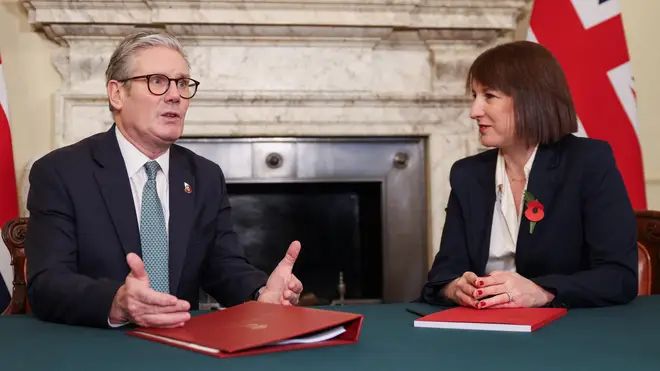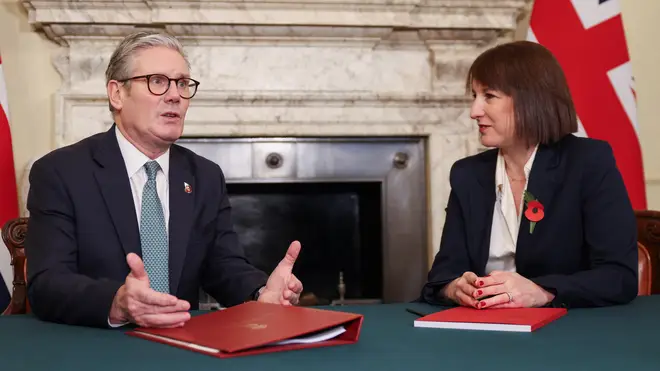
The prime minister and chancellor are set to change the rules around how pension funds invest, allowing them to use surplus funds to invest into the economy in their latest bid for growth.
Sir Keir Starmer and Rachel Reeves will meet top executives from some of Britain’s major businesses on Tuesday as they continue their quest for economic growth.
They will promise to unlock part of the £160bn of surplus pension funds held in corporate defined-benefit pension schemes by easing the rules on how businesses are allowed to manage and invest their pension funds.
The meeting will see the Prime Minister and Chancellor try to persuade bosses from businesses including Tesco, BT, Unilever and Lloyds Bank that they are committed to helping the private sector thrive as they attempt to attract more investment to the UK.
According to government estimates, around 3,750 corporate defined-benefit pension schemes – around 75% – are in surplus, holding £160bn more than the pension payments they owe their members when they retire.
Under current rules, less than £70bn of this can be returned to companies. The total assets in corporate defined-benefit pension schemes amount to £1.2tn.
The unconventional move is yet another attempt to boost the UK’s economic growth, as the government comes under increased pressure about their handling of the economy.
Reeves’ first six months in government have been turbulent, with less than impressive growth numbers, an increase in the cost of government borrowing and controversial decisions seeing some call for her to be sacked.
And with potential tariffs from the Trump administration looming, the government has been seeking growth opportunities everywhere, mostly through attracting private investment
The Chancellor’s plans will form part of larger pension reforms started by the previous government and now being taken further by Labour.
Part of these reforms include forcing the merger of local government pension schemes, which hold £400bn of assets taken together.
The meeting on Tuesday will also see the announcement of further changes to pension rules designed to increase the amount of money available for investment in the UK.
Ahead of the meeting, Sir Keir said: “To achieve the change our country needs requires nothing short of rewiring the economy.
“It needs creative reform, the removal of hurdles and unrelenting focus. Whether it’s how public services are run, regulation or pension rules, my Government will not accept the status quo.”

Labour activist on the pensions triple lock
Reeves said businesses and Government were “united on growth being the top priority”, adding that she was “fighting every day to tear down the biggest barriers to growth, taking on regulators, planning processes and opposition to this urgent mission”.
Tuesday’s meeting follows a difficult period for the government, which has seen stuttering growth figures and rising borrowing costs threaten its plans for improving public services.
At the same time, businesses have expressed increasing pessimism about their prospects for the coming year, including in light of the Budget that increased employers’ national insurance contributions – an outlook both Starmer and Reeves will be keen to address with business leaders.
The Chancellor has planned a major speech on Wednesday, which is expected to focus on growth, including further reforms to the planning system, deregulation and boosting trade and investment.
But she is also likely to face questions over the Government’s policy on building a third runway at Heathrow Airport, something several Cabinet members have previously spoken out against but which the plan’s backers have argued would boost growth.
The third runway was the only point of dissent during the Chancellor’s appearance at the Parliamentary Labour Party’s weekly meeting on Monday, according to her spokesman, with MPs otherwise expressing “overwhelming support” for her.
During the meeting, the Chancellor told Labour MPs the Government needed to go “further and faster” on growth and “must start saying ‘yes'” to major projects.
Rachel Reeves insisted this week that the need for economic growth in the UK “trumped other things” – including Net Zero goals.
The Chancellor is widely expected to greenlight plans to build the runway at Heathrow, as well as expansions at Gatwick and Luton in an attempt to boost growth.
Under the plans to be announced on Tuesday, defined benefit pension schemes that are in surplus will have more flexibility to invest some of that money in their sponsoring employers.
The Investment Association’s Jonathan Lipkin said that, with “the right guardrails in place”, the proposals “could help channel more funding into the economy by enabling schemes to invest more widely and take on greater risk, while allowing for members to receive an uplift to their pension benefits”.
Unlocking investment from pension funds has been an aim of both the current Chancellor and her predecessor, Jeremy Hunt, who have seen a limited appetite among pension funds for investing in UK assets as an obstacle to growth, choking off the funds available for both infrastructure projects and British businesses.
By Josef Al Shemary






